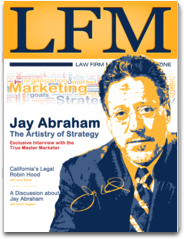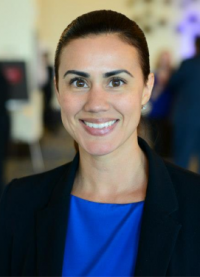Attorney Tom Metier of Metier Law Firm sits down with Author & Educator, Michael J. Swanson, to discuss a marketing program for lawyers called Ask the Lawyers.
The Dos and Don'ts of Social Media for Lawyers

Who says lawyers can't be social? A healthy social marketing plan is a key component of successful law firms across the country, but it takes more than just a Facebook profile and a Twitter handle to conquer the social media marketing world.
Before you put your law firm out on the social channels, read our list of dos and don’ts of social media for lawyers.
The Dos of Social Media for Lawyers
Do brag about your achievements. Potential clients want to see that you’re an attorney who gets results. Pictures of yourself along with satisfied clients and a brief note about their successful case can help instill confidence in your legal skills and puts a human face on your legal services.
Do engage in discussions with your followers. When someone comments on a social post from your firm, make sure you respond appropriately. Even if it’s just a compliment, thank the commenter for taking the time to write on your page. You also should look at engagement as an opportunity to ask satisfied clients for testimonials on AVVO, Yelp, Google+ and other rating/review sites.
Do post entertaining and informative content. The most shared content on social media is content that entertains and content that informs. It might include videos, photos, infographics or just helpful content. If you want your social networks to be heavily trafficked and really give you the full benefit of social marketing, you need to share content that your followers will find useful and/or amusing.
The Don’ts of Social Media for Lawyers
Don’t be arrogant. While you should share your successful cases, you also need to be tactful about doing so. Avoid gloating, demeaning or deceptive language in posts about recently resolved cases. Your goal in posting case successes is to show humbly how honored you are that your clients chose your firm for their case and how happy you are to be able to help them achieve justice for their cases.
Don’t ignore comments. The point of social media is to be social, and ignoring comments -- even negative ones -- defeats the purpose of having a social channel. You should respond to all interaction with your social profiles in a professional and prompt manner. If a discussion gets too heated, you may wish to ask politely that it ends or move the discussion to private communication.
Don’t post confidential content or content that could violate your local bar rules. Details of your recent case victories should be kept as general as possible to avoid breaching the attorney-client privilege. You also need to keep in mind that your state bar may have restrictions about social media conduct for attorneys, and you may not be allowed to post case results or may have to include a disclaimer on your profiles.
Don’t Make a Social Blunder – We Do Web Content Handles Social Marketing for Lawyers
We Do Web Content, Inc. handles social media for lawyers. We help attorneys and law firms across the nation keep their social presence up and lively. To get started, give us a call or fill out our contact form to speak with our sales manager about all of the services we offer to help grow your law firm through Internet and SEO marketing. 888-521-3880.
How to Add Value to Your Law Firm
In today's video, Michael J. Swanson interviews attorney and CPA, Joseph Fournier about the many ways lawyers can add value to their firms.
Gerry Oginski, Esq.

Gerry is a practicing NY Medical Malpractice & Personal Injury Attorney in one of the most competitive markets in the Country.
He is the author of “Secrets of Lawyer Video Marketing in the Age of YouTube,” and lectures to thousands of lawyers across the country each year, has written hundreds of articles on video marketing for attorneys and is considered the leading authority on video marketing for lawyers.
He has personally created over 1350 educational videos to teach his potential clients how cases involving medical malpractice & accidents work and is the Founder of the Lawyers Video Studio, where he has helped lawyers across the United States create over 3500 videos to market their law firms.
Gerry has used video marketing to generate settlements of over $8.6 million dollars for his own solo practice.
25 Great Neck Rd., Ste. 4
Great Neck, NY 11021
516-487-8207
Website: http://LawyersVideoStudio.com
The Power of a System - Part Four of Four
Attorney John Fisher in Kingston, New York shares with Author and Educator Michael J. Swanson feedback from lawyers across the country on how 'The Power of a System' has impacted their practice.
Social Media Marketing for Law Firms
Attorney Matthew Dubin of the Law Offices of Matthew D. Dubin, in Seattle, Washington shares with Author and Educator Michael J. Swanson a few tips for lawyers to better market their firm on Facebook.
Gerry Oginski, Esq.

Gerry is a practicing NY Medical Malpractice & Personal Injury Attorney in one of the most competitive markets in the Country.
He is the author of “Secrets of Lawyer Video Marketing in the Age of YouTube,” and lectures to thousands of lawyers across the country each year, has written hundreds of articles on video marketing for attorneys and is considered the leading authority on video marketing for lawyers.
He has personally created over 1350 educational videos to teach his potential clients how cases involving medical malpractice & accidents work and is the Founder of the Lawyers Video Studio, where he has helped lawyers across the United States create over 3500 videos to market their law firms.
Gerry has used video marketing to generate settlements of over $8.6 million dollars for his own solo practice.
The Future in Law Practice Information Management: OnPoint.Legal

Lawyers are busy. Lawyers track lots of documents and information. Lawyers need immediate access to their case information, but it has to be secure - protected. Lawyers want simple. And contrary to popular beliefs, lawyers DO have budgets.
At Symbioshare, we get that. Why? Because we ARE lawyers. But before we were lawyers, we were engineers. As lawyers, we got tired of case management resources that touted solutions, but failed to deliver. Symbioshare’s flagship product, OnPoint.Legal, is the proven result of over 4 ½ years of development and testing. As engineers, we will tell you there is nothing else like this on the market today. As lawyers, we will tell you there really is a case management solution for all those “I wish I could...” moments you’ve had sitting at your computer.
 OnPoint.Legal is a matter management software application designed to give attorneys complete flexibility and control in their practice’s case structure, organization and operations. OnPoint.Legal enables you to practice law in the way most beneficial to you.
OnPoint.Legal is a matter management software application designed to give attorneys complete flexibility and control in their practice’s case structure, organization and operations. OnPoint.Legal enables you to practice law in the way most beneficial to you.
 OnPoint.Legal integrates with Microsoft SharePoint Online allowing increased security, flexibility, reliability, enhanced collaboration and an experience unmatched by any other system on the market. Imagine, a software application that organizes, controls and displays key information in one simple view utilizing tools that you use every day, e.g., Microsoft Outlook, Word, Excel, and Internet Explorer.
OnPoint.Legal integrates with Microsoft SharePoint Online allowing increased security, flexibility, reliability, enhanced collaboration and an experience unmatched by any other system on the market. Imagine, a software application that organizes, controls and displays key information in one simple view utilizing tools that you use every day, e.g., Microsoft Outlook, Word, Excel, and Internet Explorer.
At Symbioshare, we are driven to help your practice succeed in a seamless transition to the next generation information management system. OnPoint.Legal’s integration capabilities enable lawyers to keep the information most important to your practice immediately accessible regardless of your geographic location. OnPoint.Legal utilizes the strongest features of each Microsoft Office 365 application to efficiently and effectively empower law firms to manage their practice in a matter and client centric design to collaborate on projects, track deadlines, delegate or assign tasking, and route documents for review, editing, and approval. What sets us apart is that we can help you do all of this without changing the way you want to practice law and save you money along the way. Call and let us help you today!
t: 478.254.9651
Apps for Attorneys

I recently discovered a very informative article called “iPad Apps for Lawyers” published by this group which pares down the somewhat exhaustive list of apps to about 50 that are really useful to trial lawyers. To review the entire list categorized by function, click here.
While visiting their site, I also learned a lot about their app called JuryPad.
What an amazing tool at a very reasonable price ($19.99 for the iTunes download). Watch the short promotional video for all the features and tools to assist not only with voir dire but mapping of jury pools, demographics, statistics and trial results.
Donna A. Jones
Senior Vice President
State Law TV
Statelawtv.com is an excellent website for learning more about some of the important issues facing trial lawyers and the citizens they serve.
I recently spoke to StateLawTV.com president, Cindy Speaker, to explain how quickly they can react to current events and produce quality video content that can be deployed for a variety of purposes. You can learn more at Statelawtv.com or by visiting their Youtube channel.
Michael J. Swanson

Mr. Swanson has been working at the senior executive level in trial law firm financing since 2000. He is the published author of How David Beats Goliath: Access to Capital for Contingent-Fee Law Firms and has given lectures at seminars and CLE programs nationwide, educating trial lawyers about financial management. Mr. Swanson is also a member of the ASTC.
Law Firm Marketing Magazine – Now Free!

Some of you may have heard about the new publication available for the iPad called Law Firm Marketing. If you have not, I suggest you check it out. It was launched in October of 2012. It is the legal industry’s first interactive, digital magazine and it’s now available for free! It is designed to help you learn the best marketing practices from other successful lawyers as well as some of today’s top legal marketing experts. You can get the latest issue free by subscribing on iTunes or downloading the app by clicking here. Since the magazine is digital, it makes use of video interviews, hyperlinks and other interactive content. You can download the magazine in several different languages as well.
If you do not have an iPad, don’t worry! You can view the recent video interviews feature in the magazine on The Law Firm Marketing Magazine YouTube channel.
In the very first issue, the magazine featured Gerry Spence. Spence is widely known as one of the best trial lawyers of all time, which is why he was an easy pick to be featured in the first edition of the magazine. Spence founded the Trial Lawyers College in 1994 and has an amazing record of accomplishments with zero criminal cases lost. Also featured so far in the magazine is current American Association for Justice President, Mary Alice McLarty and well-known marketing guru, Jay Abraham.
Cindy Speaker is the CEO of Speaker Media and Marketing and the developer behind the Law Firm Marketing Magazine. She is known as “The secret weapon of personal injury lawyers and trial attorneys throughout the U.S.” It is no wonder attorneys across the country run to Cindy for marketing advice, she has an extensive list of successful clients as well as a published documentary, “Well of Dreams”. She believes this magazine will help law firms stay on top of an ever-changing marketing landscape.
If you are a trial lawyer (or are involved in law firm marketing) you should download your own copy of Law Firm Marketing right now!
Tina Burns
Vice President
Michael J. Swanson

Mr. Swanson has worked at the senior executive level in trial law firm financing since 2000. He is the published author of How David Beats Goliath: Access to Capital for Contingent-Fee Law Firms and has given lectures at seminars and CLE programs nationwide, educating trial lawyers about financial management. Mr. Swanson is also a member of the ASTC.
Interesting Interview with a Jury Consultant

I recently came across an interesting article from the Consumer Attorneys of California’s Forum Magazine by Ibiere N. Seck, Esq. The article, Do I Need a Jury Consultant, features Ms. Seck’s interview with Jury Consultant Harry Plotkin. Mr. Plotkin gives a good insight what exactly a jury consultant does, why they’re effective and when is the best time to bring one onto a case.
I recommend giving the article a read. If you know any young lawyers getting ready for their first case, I highly recommend sharing it with them.
Click here to read it. Hope you enjoy!
Copyright: 123RF Stock Photo
Trial Reviews How David Beats Goliath

How David Beats Goliath – Access to Capital for Contingent-Fee Law Firms was reviewed in the June 2012 publication of Trial. Reviewer Douglass F. Noland gave a very thorough, detailed and fair review of the book. Here are a few brief excerpts:
“Author Michael Swanson’s How David Beats Goliath is a must-read for any lawyer who works on contingent-fee cases.”
“Swanson explains, in a straightforward way, how to maintain your firm’s cash flow and how to level the playing field against your opponents.”
“If Swanson’s strategy is applied faithfully, lawyers may lessen their worries about financing their cases, so they can concentrate more on the cases themselves.”
To read the complete review, click here. To purchase a copy of How David Beats Goliath, click here.
Advocate Capital, Inc.

Advocate Capital, Inc., is a commercial finance company that was founded in 1999. Our main focus is providing an alternative to the “interest free” loans that most trial lawyers make to their firms for case expenses. We do this through a unique combination of commercial lines-of-credit and specialized accounting services.
Our clients are the best and the brightest of trial law firms from all over the United States. Our typical client-firm is a well established, experienced trial law firm whose partners are high-net-worth attorneys at the “top of their game”. Many are leaders of state and national trial lawyer associations, and quite a few are authors and expert speakers in the profession.
Advocate Capital, Inc., has enjoyed consistent, rapid, profitable growth during its history and now has clients in over 35 states. We look forward to adding you to our family of satisfied clients!
Website: www.advocatecapital.com
Unsure of How to Shop for Disability Insurance?

Most people never think about the fact that a lawyer with his own firm as a small business owner. But in fact, that’s the way it is for many lawyers, whether they’re a partner, or a sole practitioner. You deal with multiple cases, handle your payroll and taxes, and manage all of the things a business needs. One of those needs being disability insurance. And anyone who has been around personal injury cases knows that having decent disability insurance can go a long way.
I recently came across an article by Darrell Zahorsky called “11 Tips For Buying Small Business Disability Insurance.” If you happen to be in the market for such insurance, click the link above to check out his article. It covers things such as:
- Defining disability
- Determining disability type
- Looking at financial ratings
And more. Give it a read. It might even come in handy for someone you know.
Photo Credit: 123RF Stock Photo
A Few Simple Rules for Mediation

If you are like most lawyers, you have probably used mediation as a means to resolve a legal dispute. Sometimes it can be in your party’s best interest to avoid trial, though there are a lot of times when you might find it difficult to come out as successful as you would’ve liked. Kendall Reed, a contributor with www.NOLO.com, came up with ten simple rules that can help a lawyer be successful with mediation. Take a look at the first five below. They may seem like common sense, but odds are they will help.
- The decision makers must participate.
- The important documents must be physically present.
- Be right, but only to a point.
- Build a deal.
- Treat the other party with respect.
Check out Kendall’s full article, Mediation: Ten Rules for Success, to see the other five rules and to get a more in-depth look at all ten.
Copyright: sakkmesterke
An Alternative to Blogging

Busy schedules and a lack of interest are probably two the biggest reasons attorneys don’t blog. What’s wrong with that? Nothing. While many may disagree with me, plenty of attorneys and other professionals have grown their business’s online presence without blogging on the daily basis. I’m not saying that abandoning the idea of sharing news and announcements online is a good idea. A few newsletters could easily make a decent replacement for blogging, and many professionals will agree.
Carolyn Elefant, a contributor for www.AboveTheLaw.com, recently wrote 6 Reasons Why E-Newsletters Beat Blogging As A Content Marketing Tool for Lawyers. Give it a read to find out how you can start using newsletters to better your firm’s marketing efforts without spending an excess amount of time.
Copyright: 123RF Stock Photo
Sam C. Rumph, III

Sam is an experienced trial attorney and engineer. As the managing partner for his law firm he has been a driving force for office automation, innovation and efficiency. It was this relentless quest that led Sam and his law partner Jeff to develop a cutting edge case management system and the formation of Symbioshare. Sam earned his B.S. degree in Ocean Engineering at the United States Naval Academy and was commissioned in the U.S. Navy in 1993. After completing the Navy’s nuclear power training program, he served aboard a fast attack nuclear submarine as a naval Submarine Warfare Officer and was certified by the Naval Reactors Division of the U.S. Department of Energy as a Nuclear Engineer. Sam holds his Juris Doctor from the Norman Adrian Wiggins School of Law at Campbell University in Raleigh, North Carolina. As a partner with Symbioshare, Sam works closely with lawyers in strategic planning to put OnPoint.Legal and its capabilities to work for their businesses.
Sam C. Rumph, III

Sam is an experienced trial attorney and engineer. As the managing partner for his law firm he has been a driving force for office automation, innovation and efficiency. It was this relentless quest that led Sam and his law partner Jeff to develop a cutting edge case management system and the formation of Symbioshare. Sam earned his B.S. degree in Ocean Engineering at the United States Naval Academy and was commissioned in the U.S. Navy in 1993. After completing the Navy’s nuclear power training program, he served aboard a fast attack nuclear submarine as a naval Submarine Warfare Officer and was certified by the Naval Reactors Division of the U.S. Department of Energy as a Nuclear Engineer. Sam holds his Juris Doctor from the Norman Adrian Wiggins School of Law at Campbell University in Raleigh, North Carolina. As a partner with Symbioshare, Sam works closely with lawyers in strategic planning to put OnPoint.Legal and its capabilities to work for their businesses.
Yvette Valencia

Yvette Valencia is an expert at writing search engine optimized Web content humans love to read and share. She specializes in helping law firms identify the information their prospective clients are searching for online and developing content strategies that drive the right kind of traffic to their sites.
Through her company, We Do Web Content, Yvette upholds the standard for quality inbound marketing. Her mission is to help lawyers understand this standard by identifying what's important to their potential clients, providing these prospects with information they'll find helpful and trustworthy, and then, seamlessly merging the two with the law firms' business goals. Most recently, Yvette authored a second book called 10 Reasons Your Website Doesn't Generate Leads, which offers law firms advice on developing an effective content marketing strategy.
Prior to co-founding We Do Web Content, Inc., Yvette honed her skills as a presenter and writer when she served as the lead corporate trainer for two major international banks: ABN AMRO Bank (4 years); and Deutsche Bank (2 years).
In addition to managing the day-to-day operations for We Do Web Content, Yvette is passionate about music, fashion, and being a loving wife and mother to two amazing little boys.
Yvette Valencia

Yvette Valencia is an expert at writing search engine optimized Web content humans love to read and share. She specializes in helping law firms identify the information their prospective clients are searching for online and developing content strategies that drive the right kind of traffic to their sites.
Through her company, We Do Web Content, Yvette upholds the standard for quality inbound marketing. Her mission is to help lawyers understand this standard by identifying what’s important to their potential clients, providing these prospects with information they’ll find helpful and trustworthy, and then, seamlessly merging the two with the law firms’ business goals. Most recently, Yvette authored a second book called 10 Reasons Your Website Doesn’t Generate Leads, which offers law firms advice on developing an effective content marketing strategy.
Prior to co-founding We Do Web Content, Inc., Yvette honed her skills as a presenter and writer when she served as the lead corporate trainer for two major international banks: ABN AMRO Bank (4 years); and Deutsche Bank (2 years).
In addition to managing the day-to-day operations for We Do Web Content, Yvette is passionate about music, fashion, and being a loving wife and mother to two amazing little boys.
Harnessing the Power of Tax Deferral for Contingent Legal Fees

Today’s guest blogger is Jason D. Lazarus, Esq. of Synergy Settlement Services. I invited Jason to explain a few techniques that I’ve seen many successful contingent-fee lawyers use to help manage their income stream, tax burden and even plan for retirement. I hope this is helpful to you.
By Jason D. Lazarus, J.D., LL.M.
Lawyers who earn contingent legal fees have a unique ability to control the timing of their income with either attorney fee structures or deferred compensation arrangements. While many lawyers fail to consider these vehicles due to lack of information, it is easy to see once one understands the options how powerful this can be for contingent legal fees. Through these mechanisms, a lawyer can forego taxation of fees earned in one tax year and spread out the income over a number of subsequent tax years. It allows a contingent fee to be paid out over time and taxed in the years each payment is received instead of in year one. This method was born out of the landmark tax decision in Childs v. Commissioner[1]. In the Childs case, the IRS challenged just such an arrangement. The IRS ultimately lost in the 11th Circuit. Since it was decided in 1996, Childs has not been challenged by the Service and has even been cited by the IRS as a precedent in a recent Private Letter Ruling[2]. According to Robert Wood, the preeminent expert on taxation of damages, “the IRS has begun uniformly citing Childs favorably, and is apparently quite comfortable with this.”[3]
The benefits of using an attorney fee tax deferral program regularly are significant. First, it allows a trial lawyer to even out what usually can be uneven cash flows. Controlling timing of income is a huge advantage over other professions where it can’t be controlled. Since a lawyer can defer only part of their fee if they so choose, there is complete control over the income a lawyer takes in any given year. In addition, there is no requirement that the client structure their monies or participate in any way with their attorney. Second, fees are invested pre-tax allowing one hundred percent of the money to earn interest and no tax is due until distributions begin. Third, it can help lower the overall tax burden by spreading taxation out over a longer period of years when hopefully the lawyer is in a lower tax bracket. It can also possibly avoid application of the Alternative Minimum Tax (AMT). Fourth, the future periodic payments from the fee structure or the nonqualified deferred compensation arrangement can be planned out to match future needs such as college tuition for children, large expenditures or retirement. The periodic payments can also be paid in the short term to assist with immediate cash flow. . Lastly, there are no limits on the amounts to be deferred or restrictions on distributions like qualified retirement plans.
There are two different mechanisms that can be used to defer taxation of fees. The first is an attorney fee structured settlement and the second is a nonqualified deferred compensation plan using a CaR trust. For an attorney fee structure, the fee is deferred through either a qualified or non-qualified assignment. A qualified assignment utilizes a fixed annuity and pays out over a specific time period or life depending on the plan selected by the lawyer. A non-qualified assignment may use a fixed annuity, high yield fixed payment rights or securities. With any type of fee structure, the fees must go directly from the defendant to the assignment corporation like a traditional structured settlement. Special language must be included in the release and an assignment document must be executed. The terms of the lawyer’s future periodic payments from the fee structure must be contained in the release.
With a nonqualified deferred compensation plan using a CaR trust, the fee is deferred by having the defendant pay the fee to the plan administrator. The investments inside the trust may be selected by the attorney and can include securities based investments as well as high yield fixed payment rights. The deferral program goes for 20 quarters with the first payment deferred 5 quarters. Each quarterly bucket is credited with investment earnings. When it is due to be paid, it can either be paid out in full, partially or deferred. If it is deferred, it goes to the end of the line of the 20 quarters worth of buckets. This allows a lawyer to elect not to receive payments at any given time if their current income necessitates more deferral. For example, a lawyer has a great year and can then decide he does not want any buckets in that particular year. With a nonqualified deferred compensation plan there is no need for an assignment or special language in the release. The details of the arrangement do not have to be disclosed in the settlement documents. The defendant would still have to make out a check to the deferred compensation plan. A nonqualified deferred compensation program can be used to retain key lawyers in a firm and potentially can be used for borrowing purposes.
The beauty of both fee structures and nonqualified deferred compensation plans is that there are no limits on the amount you can defer or participation requirements like with qualified plans. An attorney can also develop a strategy using a portion of each fee earned to create a significant amount of pre-tax and tax deferred investments. For example, a firm I work with takes a small portion of each fee ($25 to $50k) and sets up deferred fee structures. Over a 10 year period they accumulated over $1 million in deferred attorney fee structures. However, because both the fee structure and nonqualified deferred compensation plans are complex planning tools, you should employ an experienced planner to walk you through the options and develop a strategy. Both options have pros and cons. They both have technical requirements which require the help of experts. Learn more about how to maximize the fees you earn and harness the power of pre-tax and tax deferred investment options for contingent fees.
- To learn more about tax deferral of contingent attorney fees, visit www.structuredfees.com
- To learn more about Synergy Settlement Services, visit www.synergysettlements.com
[1] 103 T.C. 634 (1994), aff’d without opinion 89 F.3d 856 (11th Cir. 1996).
[2] PLR 150850 (2008)
[3] Legal Fee Structures Can Hedge the Insecurities Many Lawyers Face, Los Angeles Daily Journal (Friday August, 28, 2009) at P. 6.
Creating Seasonal Web Content for Your Law Firm

There's more to "seasonal web content" than just following the calendar patterns of spring, summer, fall, and winter. There are many more seasons that matter to different businesses. CPAs, for example, perk up around tax season, while roofers and disaster repair specialists might see a pickup in web searches for their services around hurricane season.
Attorneys: Take a Look at Your Own Seasonal Observations
Seasons exist for attorneys as well. If you've been practicing for a while you should have started to notice trends in your caseload and the types of cases you get during certain times of the year. Understanding this information will help you craft the most relevant content for the season. For example, many family law attorneys find that January is a major month for divorce cases.
Personal Injury: Consider the Recreational Seasons
For personal injury attorneys, there's never an "off season" where people don't get injured in accidents. However, depending on where you practice, there are several "seasons" that can influence the types of accidents you see.
Injury attorneys in warm coastal areas like Florida and California may see patterns of decreases and increases relative to weather and tourist season in water-related accidents.
- Boat crashes
- Parasailing injuries
- Defective water products like jet skis
Personal injury lawyers in rural areas may see an increase in hunting accidents during the various game seasons. Lawyers in or near large cities with high tourism may anticipate more accidents with lost or distracted drivers from out of town during certain seasons.
Keep in mind the major holidays to tailor content to those celebrations, like pedestrian safety for Halloween and decorating safety during the winter holidays. Another type of content to keep in mind during holidays is driving safety.
Every year AAA publishes heavy traffic warnings during major holiday weekends like Memorial Day Weekend, Labor Day Weekend, and 4th of July Weekend. These are all times when more people take road trips or drive while intoxicated from holiday parties.
Seasonal Calendars Can Help You Plan for Maximum Content Success
If you're going to take advantage of content seasons to increase web traffic and lead gathering, do some pre-planning. At the start of every year make up a content calendar and highlight all of the different seasons that matter to your law practice. They don't all have to be legal-related, either. If you have a charitable cause that's near and dear to your heart like breast cancer awareness, highlight that in October during National Breast Cancer Awareness Month.
Planning seasonal content in advance allows you to ensure your content is written, proofread, and ready to post when the appropriate season comes up. Not only does this help you keep your content timely and current, it also ensures you'll have something ready to post when you don't have a regular article or blog to go up.
If you're hitting a wall trying to come up with seasonal content, don't fret! We Do Web Content has your back! Just fill out our contact form and we'll be in touch to discuss your practice and what kind of content we can provide year-round to take advantage of the seasons and other hot topics in your area. Call us at 888-521-3880.
Harlan Schillinger

Harlan Schillinger is a thirty-nine year veteran of the advertising industry. He joined Network in 1985 to lead their attorney marketing efforts. Prior to joining Network Affiliates, Harlan was Vice President and one of the founding partners of Madison, Muyskens & Jones, in Lakeville, Connecticut. Along with his partners, Harlan founded the first syndication TV production firm's for retailers, creating television commercials that aired throughout the United States.
When asked about his approach to legal marketing and client relationships, Harlan says, "Creating opportunities and increasing market share for our advertising law firm clients is my #1 priority."
To that end, Harlan is committed to understanding each client’s business and discovering new opportunities for their growth. Throughout the year, Harlan attends many attorney meetings, conventions, and prominent roundtable forums throughout the country as a speaker and contributor, in order to help clients stay on top of the legal marketing world. He is on the National Trial Lawyers Association executive committee that puts together their annual summit each year in South Beach, FL. Harlan is both a speaker and moderator.
Harlan Schillinger is an avid motorcycle enthusiast who enjoys being a member of the most unique and prestigious custom motorcycle club in the world, the Hamsters USA. His passions are building and riding custom motorcycles and trying to play golf. Harlan sits on the Board of the Children's Care Hospital in South Dakota (http://cchs.org ), a special needs hospital dedicated to help special needs children from all parts of the country. He is co chairman of the Hamsters USA effort each year in their fund raising effort for this charity. Together with his motorcycle friends, they have raised well over 2 million dollars over the past 8 years.
Specialties:
Creative, polished and successful advertising, marketing, public relations and consulting for clients that want to flourish in their practice.
" If your not rubbin, Your not Racin"……….DEjr.
Vice President, Director of Marketing
Network Affiliates | 940 Wadsworth Blvd, Suite 300 | Lakewood, CO 80214
James Mitchell Brown

James Mitchell Brown has practiced law with passion, enthusiasm, energy and creativity since 1973which is one of many reasons has been Martindale Hubbell AV rated since he first became eligible. Jim’s practice has been almost exclusively representing people on a contingency fee basis. Jim sold his practice in 2003 for health reasons, took a year off and .in 2004 founded Attorney Consultant Inc. Jim is currently nationally known as the leading consultant for contingency fee law firms.
His first book, Marketing for the Contingency Fee Law Firm was published in July, 2012 and has helped many firms increase their practice, improve their image and do wonders for their bottom line in unique ways that define who they are as attorneys and individuals. His second book, Nuts and bolts of Law Office Management will be published this fall.
Brown has made presentations throughout the country to attorneys, law students, physicians, politicians and potential clients about issues of importance in their venues as well as appearing on National and local radio and television.
He enthusiastically shares his dedication and expertise with lawyers throughout the United States in marketing, practice management, business, crisis management, buying and selling practices and every other area of practice.
The company trademark, Enjoy Your Practice; Enjoy Your Life® is something Jim helps instill in every one of his clients.
www.attorneyconsultant.com
877-621-2022
New App for Law Firms: If This Then That (IFTTT)

By Tina Burns
Smartphones have revolutionized the business world and the ability to work on the go. From social media to content storage, it can feel overwhelming when trying to remember to backup files, add events to your calendar or even check the weather…until now.
In a recent article from Attorney Christopher B. Hopkins of Akerman, LLP, we discover the new app IFTTT (If This Then That) that “allows you to get value from your mobile device and social media without “checking in” constantly — thus reducing your internet-induced stress.” This user-friendly app requires no coding or advanced technical knowledge. You simply create ‘Recipes’ to tell the app what to do after a certain action occurs. Here are some example recipes that Mr. Hopkins mentioned:
- Facebook & Twitter: Eliminate opening both account and set IFTTT so that anything you write on Twitter with the tag “#FB” will be posted on Facebook (or vice versa).
- Save Email Attachments to Google Drive: Set IFTTT to download all email attachments to a folder in Google Drive — or set the trigger so that IFTTT will save PDF attachments in a folder if you put “#receipts” in title of an email you send to yourself.
- Weather: If it is going to rain tomorrow in [location], it will send you a text or have IFTTT send you the weather report each morning.
- Congress or Presidential Updates: Set IFTTT to email you when the President signs a new law or Congress schedules a vote on a bill.
(Read the full article “If This Then That (IFTTT) For Lawyers”)
This is just one of the many free productivity apps available for professions to help organize your life and your business.
To Join, Or Not To Join? That Is The Question.

If You Join a Bar Association, Join It for the Right Reason
Many lawyers, especially solo practitioners or those in small firms, might often find themselves wondering if joining a bar membership is worth it. The more I’ve read into this dilemma, the more I realize how common this question is. With that question in mind, I did come across two articles on AbovetheLaw.com that might help.
The first article, Will Joining A Bar Association Help Solos And Smalls Get Clients, was written by Carolyn Elefant. She doesn’t go completely against bar associations in her article, but she does make a point about how they are poor for meeting clients. This brings me to the second article.
Why You SHOULD Join A Bar Association (A Response to Carolyn Elefant), was written by Keith Lee. His reason is obvious, given the title. He points out in the article that while you aren’t likely to obtain new clients by joining a bar association, you would be still be able to enhance your business development. How so? Because you would be increasing your professional network, which can go a long way if you actually know the attorney who is opposing you in a trail.
I only scratched the surface of the articles, so feel to check them out yourself by clicking the links above. From what I gathered, I believe joining a bar association can be a good thing… If you are joining for the right reasons and picking the right association.
What are your thoughts on joining a bar association? If you’d like to contribute an article of your own on this topic, or any others, feel free to submit a “Become an Author” form by clicking here.
Copyright:Stepan Popov
James Mitchell Brown

James Mitchell Brown has practiced law with passion, enthusiasm, energy and creativity since 1973which is one of many reasons has been Martindale Hubbell AV rated since he first became eligible. Jim’s practice has been almost exclusively representing people on a contingency fee basis. Jim sold his practice in 2003 for health reasons, took a year off and .in 2004 founded Attorney Consultant Inc. Jim is currently nationally known as the leading consultant for contingency fee law firms.
His first book, Marketing for the Contingency Fee Law Firm was published in July, 2012 and has helped many firms increase their practice, improve their image and do wonders for their bottom line in unique ways that define who they are as attorneys and individuals. His second book, Nuts and bolts of Law Office Management will be published this fall.
Brown has made presentations throughout the country to attorneys, law students, physicians, politicians and potential clients about issues of importance in their venues as well as appearing on National and local radio and television.
He enthusiastically shares his dedication and expertise with lawyers throughout the United States in marketing, practice management, business, crisis management, buying and selling practices and every other area of practice.
The company trademark, Enjoy Your Practice; Enjoy Your Life® is something Jim helps instill in every one of his clients.
Harlan Schillinger

Harlan Schillinger is a thirty-nine year veteran of the advertising industry. He joined Network in 1985 to lead their attorney marketing efforts. Prior to joining Network Affiliates, Harlan was Vice President and one of the founding partners of Madison, Muyskens & Jones, in Lakeville, Connecticut. Along with his partners, Harlan founded the first syndication TV production firm’s for retailers, creating television commercials that aired throughout the United States.
When asked about his approach to legal marketing and client relationships, Harlan says, “Creating opportunities and increasing market share for our advertising law firm clients is my #1 priority.”
To that end, Harlan is committed to understanding each client’s business and discovering new opportunities for their growth. Throughout the year, Harlan attends many attorney meetings, conventions, and prominent roundtable forums throughout the country as a speaker and contributor, in order to help clients stay on top of the legal marketing world. He is on the National Trial Lawyers Association executive committee that puts together their annual summit each year in South Beach, FL. Harlan is both a speaker and moderator.
Harlan Schillinger is an avid motorcycle enthusiast who enjoys being a member of the most unique and prestigious custom motorcycle club in the world, the Hamsters USA. His passions are building and riding custom motorcycles and trying to play golf. Harlan sits on the Board of the Children’s Care Hospital in South Dakota (http://cchs.org), a special needs hospital dedicated to help special needs children from all parts of the country. He is co chairman of the Hamsters USA effort each year in their fund raising effort for this charity. Together with his motorcycle friends, they have raised well over 2 million dollars over the past 8 years.
Specialties:
Creative, polished and successful advertising, marketing, public relations and consulting for clients that want to flourish in their practice.
"If you're not rubbin', You're not Racin'"……….DEjr.
Vice President, Director of Marketing
The #1 Mistake You Are Making With Your Legal Marketing

We’re always on the lookout for useful content for our friends and clients. Today we welcome guest blogger Yvette Valencia. She is the co-founder and COO of WeDoWebContent. I hope this is useful to you!
Are you sitting in your office wondering why your attorney website content isn’t generating a flood of leads? Are you racking your brain for ways to increase your online presence and conversions to no avail? Well, you’re in luck! In this post I will reveal the number one mistake you could be making with your content strategy.
First things first – take your hand to your face and gently remove your blinders. It’s time you come to terms with the fact that you are in one of the most commercially competitive spaces on and offline. So, it makes sense that as you journey off to make a name for yourself online, you look for ways to set yourself apart from the hive and become the king or queen bee of an untapped/under-serviced area. In other words, dominate a piece of space that is not so competitive.
It’s equally as important to understand that before you can begin to think about conversion, you have to know the type of clients you want to represent. Be honest with yourself. Do you know your target audience as well as you know yourself? When asked what you want to do, do you vaguely respond: “I want to represent ‘anyone’ who has been seriously injured in an accident.” If you’ve answered “no” and “yes” respectively, it’s time for some tough love. You are not converting because your attorney website content is not laser-focused. If you’re not creating the content searchers are looking for, you will never convert them to clients.
Consider this before starting an online marketing strategy – develop a niche. Sure, some folks might say that niche marketing is bad business or that you’ll be limiting your potential clients. Not true! In fact, it’s quite the opposite. Niche marketing can open the door to:
More Effective Marketing
Focusing on the cases you really want enables you to market directly to that segment of the population with clear and actionable attorney website content. This focus will also help you and your prospects understand the types of legal scenarios your firm will and will not handle, saving you time and money, as well as increasing the amount of attention you can devote to viable cases.
More Referrals/Cases
When a prospect contacts you with a legal situation you don’t handle (or care to handle), it’s likely you know an attorney who does. A referral partner whose name pops into your mind immediately. Think of all the referrals you’d get if your peers thought of you in the same way? That’s exactly how it goes down when you position yourself as an expert in a particular field. “The dog bite attorney” or “the lawyer for toxic mold injury claims,” for instance. Your networking partners – other lawyers, doctors, etc. – will no longer have to guess who your “anyone” is. They will know who your ideal client is because you have taken the guesswork out of the equation for them. To get business, you have to make it easy on everyone. No guesswork allowed.
More Networking Opportunities
Speaking of networking, when you begin to pursue your newfound niche, you’ll start meeting other professionals in your field. For example, if you’re looking to represent individuals with injuries from asbestos exposure, you may be connecting with construction and medical professionals in the respiratory field. These connections build your potential client pool and can eventually lead to speaking engagements at industry seminars. Suddenly, your reach goes from hundreds to thousands just by narrowing your focus!
Convinced? Great!
Find Your Niche Now!
Let’s start the niche exploration process by asking yourself the following questions:
- What cases do I care most deeply about?
- Which clients do I relate to or sympathize with the most?
- Who will benefit most from my services?
- Which area of law do I already have the most experience with?
- If I were in a room with 200 potential clients and could only represent one, who would I choose?
- Who are the clients that are most likely to give me positive feedback on my services?
Once you know the answers to these questions, your path (and ultimately your attorney website content) will become clearer. Only then can you begin the process of validating your potential niche.
Validating Your Legal Niche
Start exploring your niche by researching how your ideal clients are searching for information online. Google’s AdWords tool is free and effective in identifying the terms your ideal clients are using at various stages of the buying cycle. It can also provide suggestions for similar keywords (and maybe even a new niche!).
 Keyword research is also critical in determining whether your potential niche satisfies these three criteria:
Keyword research is also critical in determining whether your potential niche satisfies these three criteria:
- Demand - are there enough monthly searches to justify going after the term?
- Buyers - is this segment of the audience hiring lawyers online? If not, you will have to identify another niche.All Posts
- Viability - are the search terms you want to go after reasonable in terms of competition? Always aim for medium to low. Otherwise, expect to engage in a costly pay-per-click campaign for the highly-competitive terms.
 If your potential niche is worth the investment, it’s time to start implementing. You do this by identifying and creating the content that will satisfy your potential clients, as well as the search engines. This is the winning combination that gets your law firm found and increases your conversions.
If your potential niche is worth the investment, it’s time to start implementing. You do this by identifying and creating the content that will satisfy your potential clients, as well as the search engines. This is the winning combination that gets your law firm found and increases your conversions.
Remember, searchers will only click on the content that promises to answer their queries. If your attorney web content is off-mark or misaligned with their needs, they will continue their search until they find a legal website that will.
How to Get Clients with Your Legal Blog

“How do I attract clients to my law firm?” Attorneys ask themselves – and others – that question all the time. The answer can be pretty lengthy. Here, we’ll discuss how to get clients as an attorney by using the content of your blog. The following three steps can help you establish authority to reach out to potential clients and then influence them to take action.
Achieve a Position of Authority
Blogs that develop a following do so because the author has established a position of authority or celebrity status. As an attorney, “celebrity” is probably not the niche you want. Acting as an authoritative source will serve you better.
Establishing authority begins with dispensing information. Spread your knowledge and expertise freely; don't make people hunt or pay for content. One way to establish yourself as an authority is to write an eBook about your legal area of expertise and offer it as a free download.
If you're not the book-writing type, develop a robust FAQ section on your website to answer the most common (and not so common) questions potential clients might have. If you have an AVVO profile (and you should) spread your knowledge by contributing to its Q&A section or posting articles to its legal library.
Learn What Your Clients Want and Deliver On It
The first steps of successful content conversion are to learn what your clients want and then give it to them. Sometimes a client will walk into your office knowing she is going to hire you to represent her. Others might know they have a legal issue but might not know if they should hire a lawyer.
It’s the same with your blog or article library. Some readers will be looking for general information about a legal topic. After reading your content, they may realize they should contact you for legal consultation. Others will come right to your website looking to set up a consultation with you.
Address both readers. Write general content about legal topics for readers not yet looking to hire you. And write content geared towards\ readers who know they need to hire a lawyer. But how do you know which topics to address?
Your own experience addressing clients’ concerns could help. Brainstorm some topics and questions you address a lot. Keyword research can also be valuable for learning what potential clients are searching for on the Internet. Tools like SEMRush can tell you how popular certain keywords are or tell you what keywords are associated with your site and competitor sites.
Make sure you have Google Analytics activated on your site as well; the queries tool can give you a lot of insight on what search queries bring the most users to your website.
Once you have some topic ideas generated, build up your blog with quality posts on those topics. Make sure you're using blogging best practices.
- Keep entries between 400 and 600 words
- Use diverse keywords and synonyms
- End with a strong call to action
Influence Readers to Take Action
A strong call to action is a statement near the end of a blog post that tells your reader exactly the action step needed to solve his or her problem. Your call to action might encourage the reader to contact your law firm. A less direct approach is to invite the reader to learn more by reading other posts on your blog or downloading your eBook.
If coming up with all this content seems daunting, don't fret! We Do Web Content specializes in online marketing for lawyers and other professionals. We produce top quality, unique legal content for law firms across the nation. Just fill out our contact form and we'll reach out to you to discuss a custom content plan to draw readers to your website and convert them into clients. You can also call us at 888-521-3880.
Why You Want Your Law Firm on Wikipedia (If You Can Get It There)

By Adam Rowan, Content Specialist at Page 1 Solutions
For many years, Wikipedia was seen as a dubious source of information. Its open-source model initially gave the impression that pages on the platform were riddled with questionable quality and unreliable research, especially among academic and professional circles.
However, few websites have so rigorously enforced quality standards, and Wikipedia is now recognized not only as a prominent, trustworthy brand but a go-to source for information on people, places, companies, and other entities. When you do an online search, relevant Wikipedia pages consistently rank on the first page of results.
Not just anything or anybody can qualify for inclusion on Wikipedia, and law firms are no exception. But if your firm has the extensive history and quality backlinks that are the hallmarks of any good Wikipedia article, there are several benefits your firm's website can enjoy from being included among the nearly 5 million articles on The Free Encyclopedia.
Benefit #1: Search Authority
Wikipedia has a perfect 100 domain authority score, a metric developed by search engine optimization (SEO) company Moz to analyze and predict the performance of a given website in search results. This score means that pages from the domain are extremely likely to rank well in search.
If your firm is the subject of a Wikipedia article, make sure there is a link back to your website somewhere on the page. A backlink from such an authoritative domain like Wikipedia (even if marked “No Follow”) should enhance the authority of your own site, potentially increase your performance for target keyword terms against your competitors, and generate more website traffic.
Benefit #2: Consumer Legitimacy
As noted in a recent Inside Business article, only 10 percent of online consumers trust the advertising created by brands. More and more consumers are seeking out third-party sources, such as review sites, to arm themselves with what they perceive to be impartial information before choosing to engage with a brand.
Today, few websites enjoy greater objectivity in the eyes of consumers than Wikipedia. Though anyone can create an article, new articles are reviewed within days by moderators who can and will enforce Wikipedia's guidelines for acceptable content. One of those guidelines is eschewing content that reads like an advertisement.
If your law firm is deemed noteworthy and the Wikipedia page provides verifiable information that isn't written in a promotional fashion, the more likely it is that the article will stay online. The longer the article is online and the better written it is, the better your brand will look to clients seeking legal services.
Benefit #3: Potential Knowledge Graph Placement
Over the past few years, you've likely noticed that some of your searches on Google return not just the expected list of results but also informative, eye-catching graphic boxes displaying information and images relevant to your search. This is Google Knowledge Graph, a tool engineered by the search giant to deliver answers more immediately to users.
How is Google able to find and display this information in such a neat little package? The search engine crawls a number of reliable websites for digestible information, and one of the most reliable is Wikipedia.
A search for a big-name brand will likely return a Google Knowledge Graph result. But you don't need to be a Fortune 500 company to show up on the Knowledge Graph. Your firm can also appear in these results.
First, as discussed recently by Search Engine Land, your firm will need to have an article on Wikipedia and be entered as an entity in Wikidata, a data knowledge base Google crawls to provide Knowledge Graph results. Then, by using structured data markup tagging on your site (see the article to learn how to do this), you tell Google that your website is the same as the entities identified on Wikipedia and Wikidata, thus increasing the likelihood that your firm will show up prominently as part of Knowledge Graph.
The information that shows up in a Google Knowledge Graph result is difficult to predict, and like anything in SEO there is no guarantee that the above process will work. But the increased visibility of your firm above and beyond traditional search results is another way to set yourself apart in the eyes of users in need of an attorney.
Here are a few examples of law firms and lawyers with Wikipedia pages:
- https://en.wikipedia.org/wiki/Melvin_Wright
- https://en.wikipedia.org/wiki/Colling_Gilbert_Wright_%26_Carter
- https://en.wikipedia.org/wiki/Thomas_R._Kline
- https://en.wikipedia.org/wiki/Shanin_Specter
- https://en.wikipedia.org/wiki/John_H._Hickey
At Page 1 Solutions, we regularly work with attorneys to identify the aspects that set their firm apart and use those strengths to build competitive Web marketing campaigns. If you're struggling to find traction in search results, Page 1 Solutions can help! Call (800) 368-9910 to speak with one of our team members.
Copyright: 123RF Stock Photo
Capturing Clients with Keywords: The Art of Search Engine Optimization

We are always on the lookout for valuable content to share on our blog; adding worth beyond case expense financing for our readers. Today we welcome guest blogger Yvette Valencia. She is the co-founder and COO of WeDoWebContent. I hope this is useful to you!
If you’re reading this post, you likely found it in one of two ways: you’re either a subscriber to our blog or you used a search engine, like Google, to find information on “capturing new clients.” If the latter is true, my keyword (or “on-page search engine optimization”) strategy worked. You see, I wrote this article for two reasons: 1) to educate and help you succeed on the Web; and 2) to attract potential clients to my company’s website where they could learn more about our services and eventually hire us to design their law firm’s search marketing strategy.
Today I am here to tell you that you can do the same for your law firm. When you research and use the terms your ideal clients are using to find information on the Web within your Web content, you increase your chances of being found. And, when you write truly informative pages, ones that give your readers valuable takeaways, you will earn your stripes with Google and be rewarded with top spots on their search results pages (referred to as “ranking”).
During my presentation at the Broward County Hispanic Bar Association’s monthly luncheon, I revealed the biggest mistake most lawyers make with their legal marketing strategy and offered tips on creating a loyal fan base for the purpose of expanding their firms’ reach and increasing referrals. Now I’m ready to discuss one of the most powerful components of search marketing: keywords.
If you took the time to identify and develop a niche for your business and are taking the necessary steps to grow your practice, you will have a good idea of how your ideal clients search for information on the Internet. So if you want to continue building your list with similar clients, you should start by looking to your current clients for keyword inspiration.
Get Into Your Clients’ Heads
Conducting interviews with past clients can help you better understand how they search for legal resources on the Internet. Some questions you could ask are:
- When you were searching for a personal injury attorney, what was more important: 1) their office location; or 2) their specialty or exclusivity in handling cases similar to yours?
- How did you initiate your search? Did you believe you had a viable legal issue and knew you needed an attorney and therefore started your search there, or did you set out to learn whether or not you had a legal issue?
- If you received a referral from a friend or family member, did you first research the attorney or firm online or did you contact the attorney without researching?
- Did you search for lawyers that handled the type of accident in which you were injured or the specific injury you suffered?
Conduct Research & Analyze the Data
More and more people are using search engines like Google and Bing to find products and services on the Web. By analyzing what your prospective clients are looking for and how they are searching for it online, you will increase the chances of your website appearing on the first page of their search results.
You’ll want to start by gathering data from your website’s analytics service, as well as using a couple of independent keyword tools available on the Web. When you work with data that is accurate, you move away from assumptions and the dreaded possibility of wasting a lot of time and money.
Keyword tools allow you to evaluate the performance of millions of search terms – an essential step for creating the best keyword list for your business.
Google AdWords is a free and pretty robust keyword tool that provides the popularity and competition level of a specific keyword, as well as related keywords. You should be expanding your focus beyond the original keywords you research and open yourself to similar search topics – synonyms are great!
When coded properly into your website’s off-page code, Google’s Webmaster Tools and Analytics will track your domain’s performance and offer a treasure trove of information. In other words, from these tools you can gather up-to-date data about your audience, traffic sources, content, and conversions. In some instances you will be able to see the keywords that were responsible for drawing in new and repeat visitors, and which of them also led someone to buy your products or enlist your services. You’ll want to continue to promote these keywords within your Web content so as to not compromise your rankings and the ability to generate leads.
SEMRush is a paid keyword tool that’s definitely worth the price. You can track the performance of your chosen keywords over time. And, the reports you can generate will take the guesswork out of determining whether a keyword will be beneficial to your content as far as attracting potential clients.
You can generate lists with hundreds of keywords using these tools, but the real trick is knowing how to choose and target the right ones.
Evaluate Your Keywords
 The keyword lists you generate during the research phase of your Web content strategy are only suggestions of what MAY work. To truly unearth the money-making keywords, you have to evaluate these keywords based on the following three points:
The keyword lists you generate during the research phase of your Web content strategy are only suggestions of what MAY work. To truly unearth the money-making keywords, you have to evaluate these keywords based on the following three points:
#1: Relevancy to your website. Ranking for a keyword that is completely unrelated to your company, your products, or service is completely futile. For example, a personal injury law firm has no business ranking for the keyword “teen pop star” unless it only represents celebrities like Justin Bieber. This will only lead to meaningless website traffic and do nothing for your firm’s bottom line. Instead, focus on the keywords that are closest to the end of your sales cycle so you can increase your chances of generating leads and gaining new clients.
Quality over quantity is the name of the game.
#2. Popularity in terms of web traffic and conversion potential. While keywords with high search volume can drive traffic to your website, they may not do much in the way of converting visitors to clients. This is why keyword research is critical to the success of any online marketing campaign.
A visitor to your website is just another notch on your Web traffic belt. You’re better off paying attention to the keywords that have the best conversion potential. Before you put all of your eggs in the expensive, high-competition-keyword basket, test the effectiveness of your business’s most important phrases with some pay-per-click (PPC) advertising campaigns.
If your chosen keywords are generating Web traffic and new leads, you know you’re on the right track.
#3: Competition to rank for the keyword. While it’s great to want the #1 spot on page one of Google for “personal injury lawyer,” it’s highly unlikely that your law firm will gain this position using only organic marketing methods.
Your organic marketing efforts will consist mainly of a Web content strategy that ethically infuses both the keywords and synonyms your target audience is using to find the topics that interest them. Unlike paid advertisements, which I will go into shortly, the Web pages you create are indexed by the search engines, which means they will exist on the Web forever and will be served to the searcher every time your page meets their search criteria at no additional cost.
Knowing the competition level of a specific keyword will allow you to determine what it will take to rank for it and whether or not you are willing and have the budget to jump through those perpetual hoops.
Be Open to Pay-Per-Click Advertising
Most times, acquiring and/or maintaining a top position for a highly-competitive term means you will have to engage in a lengthy and expensive pay-per-click campaign.
The Beatles said it best in their 1964 chart topper “Money Can’t Buy Me Love,” but it can buy you a spot on Google’s search results pages. Through the search engine’s AdWords program, Google allows businesses to buy ad space on page one for the keywords they want to target, but this is a costly option, especially for attorneys whose top search terms typically range from $50 to $80 per click.
In highly-competitive geographic areas, like South Florida, Denver, Colorado, and Los Angeles, California, for example, engaging in pay-per-click advertising is necessary for the long-term health of your online presence. However, in other, not-so-competitive areas, you can get away with engaging in a modest and temporary pay-per-click campaign meant to accelerate your website’s exposure and ranking, as well as complement your organic (non-paid advertisements such as landing pages, informative articles, and blog posts) efforts.
The one advantage to pay-per-click advertising is that you will find out very quickly whether or not a highly-coveted term is actually a money-making term. If it’s not, you can drop it from your campaign and invest your money in another term that will actually generate qualified leads for your firm.
Get Organized!
A smart and savvy businessperson is always organized. Microsoft Excel can be your best friend when it comes to organizing and tracking your keyword placement once the research and evaluation phases are complete.
You’ll want to develop a keyword matrix that has separate worksheets to group related keywords. For each keyword, keep notes on their popularity and competition, as well as when, where, and how you used them within your pages.
Discover How We Do Web Content Can Boost Your Online Presence
There’s no doubt that developing a keyword strategy for your website is a daunting task, especially when you have a successful law firm to run! Don’t take up your valuable time researching keywords when We Do Web Content can do the work for you!
Get started on one of our SEO plans today. Call 888-594-5442 or complete our online contact form to speak with our sales director about all of the services we offer to grow your practice.








